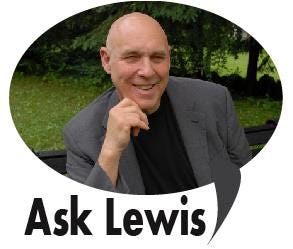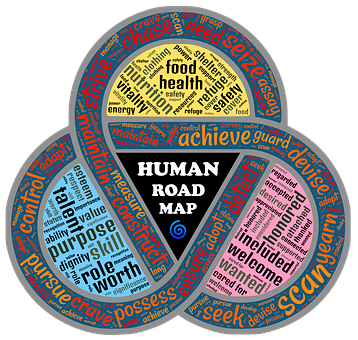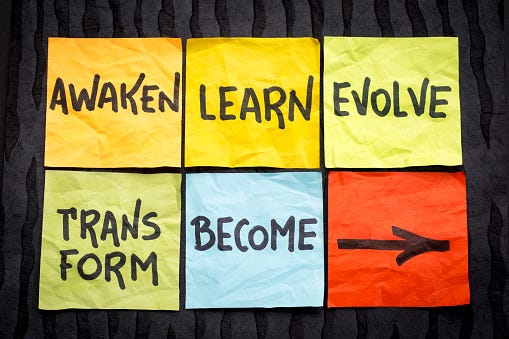The Best Approach for Depression
And some thoughts about mindful meditation and antidepressant medication
“This newsletter serves a demographic of highly intelligent readers, deep thinkers, life hackers, preppers, entrepreneurs, and survivalists. I especially focus on those with a passion for ideas, critical thinking, strategic game theory, and a desire to understand the world around them. Readers of my posts are usually tired of being patronized elsewhere by fact-less, opinionated know-nothings, misinformation, conspiracy theories, and fake news.
“Knowledge is power, wisdom brings meaning, contentment, and happiness!”
The Life Strategies Playbook & Mentoring Program is a reader-supported publication. To receive new posts and support my work, consider becoming a free or paid subscriber. (Sign up for free at the end of this newsletter)
The Life Strategies Playbook & Mentoring Program is a reader-supported publication. To receive new posts and support my work, consider becoming a free or paid subscriber.
———————————————————
———————————————————
On a personal note: Please excuse grammatical errors, typos, repetition, and any general nonsense, and such in this post. I am getting a bit older now, and I have about 20,000 pages of information that must get published before I leave the mortal coil. I simply write and publish more than my humble editors are able to correct. If you find enough errors you are welcome to contact me about being an editor of my work.
Thanks for sharing this newsletter with your friends and associates -
Join us for daily tips on personal development at our free Self-Improvement for Beginners Community and Forum
Click Below or cut and paste the URL to Join
https://www.facebook.com/groups/455029215769173
———————————————————
A 5 - Minute Read
The Journey of Depression: A Poem
The Journey of Depression: A Poem
Clinical depression can make you feel unhappy,
And the signs of depression can make you feel crappy,
It can really ruin your day,
And may seem like it’s here to stay.
This spiritual block,
Puts the mind in a knot,
And we may need to pray,
For a better way.
A depression definition is hard to find,
Maybe it’s chemical, or your thoughts from behind.
If you want to know what is best,
Get a depression test
The past can be rough,
Even if your tough,
For there are so many forms,
Some short-term and others long,
There’s manic depression,
Called bi-polar now,
And though there are meds for it,
Most patients will disavow,
For the side effects are there,
And of these beware,
Try gardening, laughter, nutrition and such,
They just may work if you’re not in a rush,
And if you can’t get out of these sadness boats
To get you smiling try depression quotes.
So while in limbo in these depression memes,
Read below for some solution themes.
I have a coaching client who has experienced various levels of extreme unhappiness and depression for over forty years. He goes on and off medication, depending on which psychiatrist he is seeing at the moment.
One of his therapists, a deeply spiritual guy, a rational thinker, and a person involved with mindful meditation, and Transmodern Zen always tell him, “not to take antidepressant medication unless you must.” It is a sort of rule for this therapist, the exception being patients with suicidal tendencies.
I’ve read some papers that this psychiatrist has written and I find his ideas interesting. Among many ideas he presents, he writes, that the treatment of depression often takes place by increasing the activity of one or more brain chemicals called monoamines, which include dopamine, norepinephrine, melatonin, and most important concerning depression, serotonin. This effect on these brain chemicals is usually accomplished through the use of antidepressant drugs. Sixty to seventy-five percent of those suffering from clinical depression experience relief of their symptoms when on these medications. Unfortunately, this relief comes with a heavy cost. Side effects. Before I dove into the subject, I researched the most common question people have about clinical depression. These are what I came up with:
· Describe the management of depression,
· What is the “state of depression?
· What are 4 major causes of depression?
· What is used to treat major depression?
· Can depression change your brain permanently?
· What are the 13 uncommon symptoms of depression?
· What are the best treatments for depression?
· Is depression usually cured?
· How does one overcome depression and anxiety?
· What are some of the most effective ways to fight depression?
· Is anti-depressant medication good or bad?
People will use prescribed drugs to alleviate the symptoms of certain types of depression even when the depression might be best addressed by simply feeling and processing the emotion. Certain emotions need to be experienced as a healthy part of living and medications interfere with this process.
At this time, the traditional psychiatric approach to depression is to prescribe antidepressant drugs that are chosen based on the individual’s symptoms. Many antidepressant drugs are able to selectively mimic and enhance brain serotonin activity. Sadly, this process may result in unwanted side effects contributing to other long-term physical and emotional complications.
The main groups of antidepressant medication are Serotonin reuptake inhibitors and heterocyclics, MAO inhibitors, and Lithium (generally recommended for people who have bipolar disorder illness.)
Are these drugs really necessary?
Over thirty years ago Dr. Sidney Wolfe, at the time the head of Public Citizen Health Research Group, "People deserve to feel better. But they are resorting to drugs to deal with the problems of living."
In spite of all the television commercials suggesting that "Bob" or "Sue" have not been their jolly, happy selves for the last few weeks, and should take anti-depressant medication to be happy and jolly again (in spite of all the side effects also mentioned in the same commercial); the fact is, unless it is absolutely necessary, the evidence does not support the use of anti-depressant medication as the most effective approach to this problem. No matter how effective medications are at the beginning, the fact remains that they do not correct ingrained character difficulties.
Short-term hospitalization may be necessary during times of extreme stress, impulsive behavior, suicidal patterns, or substance abuse.
But for many individuals, long-term outpatient psychotherapy, biochemically-based nutritional and herbal approaches, emotional healing, spiritual counseling, laughter therapy, journal writing, and group therapy where the group vision and style match the client's needs, can be very helpful.
Though some individuals respond dramatically to any of a number of natural approaches to deep-rooted chronic depression, more often than not, treatment is difficult and long-term. The symptoms of depression may often interfere with the therapy process. Periods of improvement may appear and suddenly be replaced with a worsening of some symptoms but hope should never be lost. Over time, most people experience a great reduction in their depression and the associated symptoms of co-existing disorders.
Side Effects from Medication
When a person is depressed and also suffering from other physical or emotional problems the physician must explore each symptom and determine which is the most disabling for the individual. Once this is determined, a team approach can create a treatment program for that condition. Unfortunately, the traditional medical approach requires the use of drugs to treat each condition and these drugs almost always have some side effects.
Common side effects of antidepressant medication can include:
insomnia,
sexual dysfunction,
headaches,
nervousness,
insomnia.
Prozac, the most popular anti-depressive, has been implicated in violent behavior, suicide, and other health risks. Prozac first appeared in the U.S. in 1988 and it became one of the most widely prescribed antidepressants in the country. It remains popular, although newer drugs are now available, such as sertraline and citalopram.
These drugs may even cause inefficient assimilation of certain vitamins, minerals, and other essential nutrients. This becomes another link in a long chain of events that can lead to depression.
Keep in mind that some of the drug side effects may create new conditions or mask other problems without ever getting to the depression itself. My mother, in addition to having heart problems, had a buildup of water in her system. Medication for this problem was effective but caused her to itch constantly. This went on for a year. She seemed tortured and her depression was exacerbated by the fact that she was constantly scratching with seemingly no relief. After a year and much conversation, her physician reduced some of the medication. The itching stopped within a day or so, as did the depression.
Diagnosing and treating clinical depression needs to be more than the process shown in television or anti-depressant medication. "Gee, Bob really hasn't been himself for a month or so.” Says the voiceover on the television commercial. “Maybe he should see his physician and get this great new antidepressant medication. Of course, it may have some side effects including, difficulty in breathing, hypersensitivity, dizziness, insomnia, hallucinations, confusion, convulsions, headaches resulting from a sudden fall in blood pressure, blurred vision, gross liver damage, and urine retention. Of course, it shouldn't be taken by someone taking hormones like corticosteroids, medications used to treat gastrointestinal disorders, heart medications like beta-blockers and calcium-channel blockers and antibiotics.”
Knowing about these side effects is essential for a person taking anti-depressant medications. Should a person even be taking these medications because they haven’t been themselves or because they’ve been sad for two weeks? I think not!
Final Thoughts
Since some types of depression do not respond to one drug, doctors may prescribe four or five different drugs. Even when medication can reduce and even control certain symptoms of depression, they are not a cure for the disease. Most severely depressed people who use drugs as their sole treatment risk further breakdowns.
Medications in general tend to be very complex in structure. So complex in fact that it is virtually impossible to know off-hand which drug might react with every other drug, food additive, and nutrient that it might come in contact with. In the end result, these drugs should only be used when absolutely necessary since the brain has tremendous difficulty metabolizing them.
"There is too often an unrecognized link between depression and other medical, mental, and substance abuse disorders," said Dr. Rex W. Cowdry, acting director of the National Institute of Mental Health. "Co-occurring depression is common and can have a big impact on treatment and recovery, but many people, including doctors, are not addressing it as a serious problem."
A report explored as far back as 1998 in an issue of U.S. News and World Report quoted Raymond Wosley, chairman of the department of pharmacology at Georgetown University in Washington D.C. as saying "We are really in love with prescriptions....we pop pills without thinking of the consequences..."
Today we know that adverse drug reactions are one of the largest causes of death in the United States, after heart disease, cancer, and stroke."
Reminder: If you are under medication, know the side effects of every drug you are taking and any interactions they may have with other medications, nutrients, or herbal products. Also, explore things like biophilia; dance-art-music therapy, yoga, Tai chi, Cognitive Behavioral therapy, and Journal Writing.
——————————————————————————————————————
Author: Hey there. My name is Lewis Harrison, and I am a wellness coach, teacher, and prepper. I am a proponent of entrepreneurism and also a writer and seminar leader. The author of over twenty books, and numerous self-improvement, business success, and personal development courses, I am the former host of a talk show on NPR Affiliated WIOX91.3 FM.
“I believe, to be happier, more effective, efficient, precise, productive, successful, and more self-aware, we need a coach or mentor. I have always had them, usually more than one. If you are ready, willing, and able to give up your unnecessary struggle, consider contacting me about becoming your coach-mentor.”
I can be contacted directly for my courses, business and life coaching, and training in how to win the game of life, at LewisCoaches@gmail.com
To get regular tips, techniques, life hacks and prepper shortcuts join our community of creators and innovators. It’s free. Click here -Join my group of 18,000 influencers.
The Life Strategies Playbook & Mentoring Program is a reader-supported publication. To receive new posts and support my work, consider becoming a free or paid subscriber.






